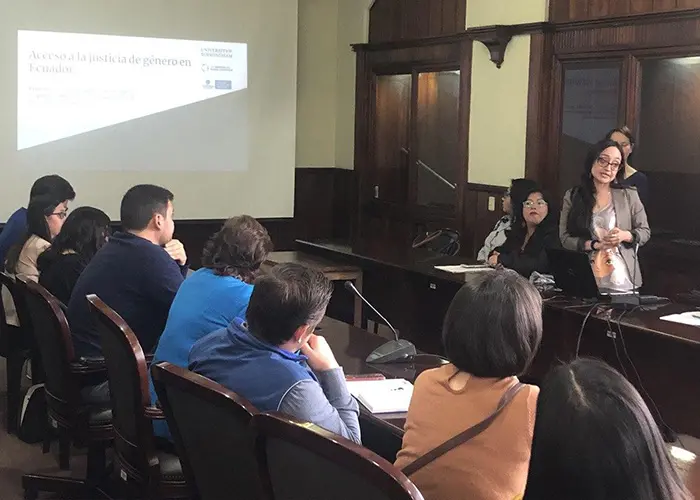Research of the Faculty of Legal Sciences presented in the Municipality

On Wednesday, March 4, a delegation from the Faculty of Legal Sciences headed by Professor Silvana Tapia presented the findings of their project "Access to gender justice in Ecuador: experiences of women users of courts specialized in violence against women and the family, in Cuenca" in the Councilors' Chamber of the Municipality of the Azuaya capital.
The presentation was made within the framework of the Cantonal Bureau for the Eradication of Gender Violence, which brings together several actors from the canton in order to evaluate the public policies that are designed and implemented to counteract gender violence.
The Gender Department of the University is part of this table.
"In that context, our team made a brief presentation of the findings, showing that the legal provisions of the penal code, in particular the procedural ones, do not sympathize with the experiences lived day by day by women survivors of violence, who do not have as central objective, when they try to access justice, the criminal conviction of the aggressor, but rather require immediate protection against a serious situation of ongoing violence, "explained Dr. Tapia and added:
"Paradoxically, according to the law, when a complainant does not appear at the hearing, any protection measure granted - the aid ticket - loses effectiveness because the process is discarded due to lack of evidence."
The investigation of the University team showed that the majority of complaints filed in specialized courts are dismissed due to the abandonment of the process, with only 11% of all complaints filed in the courts between 2014 and 2019, which concluded with guilty verdict.
The so-called "abandonment" of the causes by the complainants, according to the in-depth interviews carried out, is due to their precarious economic situation, fear of worsening violence, loss of custody of children and in general to a non-identification of his personal reality with the functioning of the justice apparatus, including the inadequate intervention of the police, the teacher concluded.


